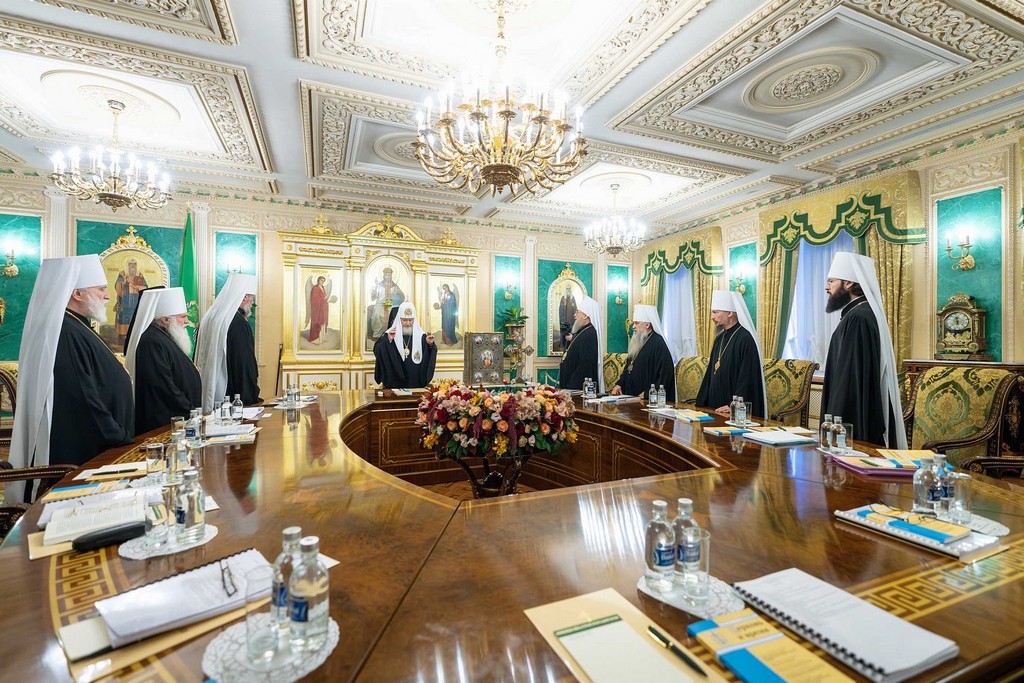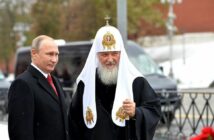Source: Peter Anderson, Seattle USA
On Wednesday, October 11, the Holy Synod of the Moscow Patriarchate met at the Danilov Monastery in Moscow. The meeting had not been previously announced. The minutes of the meeting can be read at (link). Changes were made in three important positions of the Moscow Patriarchate. The first change is that Metropolitan Lazar of Simferopol and Crimea is retired by the Holy Synod. See Journal entry 92. The retirement of Metropolitan Lazar is not a surprise. He was born in 1939 (thus 84 years old) and has served as the head of the Simferopol and Crimea diocese since 1992 (31 years). In 2012, he became a permanent member of the Holy Synod of the Ukrainian Orthodox Church (UOC). Based on an appeal by Metropolitan Lazar, the Moscow Synod, on June 7, 2022, accepted the Simferopol diocese into the direct canonical and administrative subordination to the Patriarch of Moscow and All Rus’ and the Moscow Synod. (link) On March 20, 2023, the Holy Synod of the UOC removed Metropolitan Lazar as a permanent member of the UOC Synod on the grounds that it was not possible for him to take part in the meetings of the UOC Synod. (link) However, the UOC took no other action against him.
Although the retirement of Metropolitan Lazar is not a surprise, it is a surprise that he has been replaced by Metropolitan Tikhon of Pskov and Porkhov, who was simultaneously released from the administration of the Pskov Metropolis. Metropolitan Tikhon (Shevkunov) has never previously worked in Crimea or Ukraine. (link) However, in March 2023, he accompanied President Putin to Crimea for the observance of the ninth anniversary of the annexation of Crimea. (link) Why was he selected? It strengthens the bonds between the Orthodox hierarchy in Crimea and Moscow. However, in my opinion, it may also be the first step towards making Metropolitan Tikhon a permanent member of the Moscow Synod. As is well known, Metropolitan Tikhon has a strong friendship with President Putin. In discussions with respect to possible successors to Patriarch Kirill, Metropolitan Tikhon’s name is often mentioned. Permanent membership in the Moscow Synod would be a logical next step in his advancement. Because of the close relationship between Tikhon and Putin, it is very unlikely that Patriarch Kirill would make a transfer which would be viewed negatively by Tikhon.
The second surprising change is that Metropolitan Leonid of Klin is no longer the Patriarchal Exarch of Africa. Journal entry 93 provides the following decision:
- In connection with the report of His Eminence Metropolitan Leonid of Klin, which was received in the name of His Holiness Patriarch of Moscow and All Rus’ Kirill, outlining the reasons preventing him from fulfilling the duties of Patriarchal Exarch of Africa, release Metropolitan Leonid of Klin from this position with gratitude for the labors incurred and with the preservation of his temporary management of the Yerevan-Armenian diocese.
- To appoint His Eminence Bishop Konstantin of Zaraisk as acting Patriarchal Exarch of Africa.
This states that Metropolitan Leonid provided to Patriarch Kirill the reasons why he was prevented from fulfilling the duties of Patriarchal Exarch of Africa. Metropolitan Leonid still retains his position as temporary head of the Yerevan- Armenian diocese, a position that he first obtained in October 2021. (link) This is clearly a demotion. The big question is whether Metropolitan Leonid truly sought to be removed from the position of Exarch or whether Patriarch Kirill in fact directed Metropolitan Leonid to provide reasons why he could no longer perform the duties of Exarch. Metropolitan Leonid has an extremely active Telegram channel, but there is no reference to the change or the reasons for it on his channel. (link) One website has stated: “Source in the Russian Orthodox Church: Metropolitan Leonid of Klin, Patriarchal Exarch of Africa, was dismissed for connections with Prigozhin and the Wagner PMC. Metropolitan Leonid, like General Surovikin, was a secret honorary member of the Wagner PMC.” (link) Another possible reason is that Metropolitan Leonid made many indiscreet comments, completely unrelated to Africa, on his Telegram channel. Some of these indiscreet comments have been discussed in my previous newsletters.
Bishop Konstantin (Ostrovsky) of Zaraisk was appointed acting Patriarchal Exarch of Africa. On August 25, 2022, the Holy Synod had appointed Konstantin a vicar of the Patriarch of Moscow and All Rus’ with instructions to head the newly created missionary department of the Moscow diocese. (link) His heading of the missionary department presumably gives him some qualifications to be the acting Exarch.
A third surprise is that Metropolitan Dionysius of the Resurrection was released “from his duties as manager of affairs [chancellor]of the Moscow Patriarchate, permanent member of the Holy Synod of the Russian Orthodox Church, member of the Supreme Church Council, post of First Vicar of the Patriarch of Moscow and All Russia for the city of Moscow, manager of the Central Vicariate of the city of Moscow, secretary of the Inter-Council Presence, chairman of the Church-wide Disciplinary Commission under the Patriarch of Moscow and All Russia, chairman of the Interdepartmental Working Group for coordinating assistance provided to the dioceses of Donbass and adjacent territories located in the conflict zone, and abbot of the Novospassky Monastery.” See Journal entry 91. While losing all of these responsibilities, Dionysius now becomes the head of the Omsk and Tauride diocese and the head of the Omsk Metropolis. Omsk is the third-largest city in Siberia after Novosibirsk and Krasnoyarsk, and the twelfth-largest city in Russia.
The new manager of affairs and permanent member of the Holy Synod with the title “Resurrection” will be Metropolitan Gregory of Ekaterinodar and Kuban. Ekaterinodar is the old name for the city of Krasnodar. It was the historical center of the Kuban Cossacks. The west end of the famous Kerch bridge is in Crimea while the east end is in the Krasnodar district (krai). The Kuban Metropolis, headed by Metropolitan Gregory, includes the famous city of Sochi. It is therefore very likely that President Putin knows Metropolitan Gregory personally. The appointment of Metropolitan Gregory to the Holy Synod gives the South additional representation on the Moscow Synod. This helps to tie the South to Moscow. This may be important as Metropolitan Onufry, primate of the UOC, has not been attending meetings of the Moscow Synod since the beginning of the Ukrainian war.
Metropolitan Gregory will be the fifth manager of affairs (chancellor) under Patriarch Kirill. In certain situations, the chancellor has been a very powerful position. For example, Metropolitan Alexy (later Patriarch) of Leningrad held the position for 22 years. Metropolitan Anthony of Boryspil has been chancellor of the UOC since 2012 and has become the second most influential hierarch in the UOC. By frequent changes in the holder of the chancellor position, it is very unlikely that a chancellor under Patriarch Kirill will become a major player in the Moscow Patriarchate.
All three of these major changes make sense from a Russian political point of view. Whether President Putin was the original source of these changes is a matter of speculation.
In Journal entry 111, the Holy Synod dealt with the difficult situation in Sofia. In paragraph 1, the Holy Synod stated: “Express a categorical protest in connection with the rude and discriminatory actions of the Bulgarian authorities in expelling from the country under a far-fetched pretext the representative of the Patriarch of Moscow and All Rus’ to the Patriarch of Bulgaria, the rector of the Compound of the Russian Orthodox Church in Sofia, Archimandrite Vassian (Zmeev), the secretary of the Compound, Archpriest Evgeniy Pavelchuk, and employee V. Bonko.” In paragraph 7, Archimandrite Vassian is now appointed the head of the Russian spiritual mission in Jerusalem. In paragraph 5, Archpriest Vladimir Tyshchuk, a priest of the Vienna-Austria diocese is made the new representative of the Patriarch of Moscow and All Rus’ to the Patriarch of Bulgaria and the rector of the Metochion [St. Nicholas Church] of the Russian Orthodox Church in Sofia. Tyshchuk presently serves at the St. Nicholas Cathedral in Vienna. In a TASS interview, Archimandrite Vassian has praised the selection of Father Vladimir. (link) Vassian stated: “I believe that this is a worthy person, and our parishioners in Sofia have received a good priest, who, I have no doubt, will become a good mentor for them….Of course, the appointment of a new rector by the Holy Synod of the Russian Church will make it possible to open the Russian church in Sofia and resume regular services there, as was the case in all previous years.” The TASS article also states that Father Vladimir is the son of a priest who served in Sofia in the 1970s. A religious website in Bulgaria has posted additional information about Father Vladimir. (link) Father Vladimir had previously worked in the protocol section of the DECR and as secretary of the patriarchal parishes of the Moscow Patriarchate in the United States. To date, I have seen no reports of the reaction of the Bulgarian government or the Bulgarian Patriarchate to the new appointment. There is still the unresolved question of whether the Bulgarian Patriarchate or the Moscow Patriarchate has jurisdiction over St. Nicholas Church in Sofia. Presumably, the Bulgarian Patriarchate will contend that Patriarch Neofit must approve the appointment of Father Vladimir as rector of St. Nicholas Church. Therefore, the dispute in Sofia may not be over.
There is the sad news from Geneva that the planned roundtable organized by the WCC and involving the UOC and the OCU will not be held in October as hoped. (link) WCC general secretary Rev. Prof. Dr Jerry Pillay has announced: “Unfortunately, despite our best efforts over the intervening months, practical and political obstacles to the participation of the Ukrainian Orthodox Church (UOC) and the Orthodox Church of Ukraine (OCU) as core participants in any such dialogue process render our plans impracticable for the time being. We continue to believe that the engagement of both the UOC and the OCU is an essential foundation for the dialogue process we envisage, for promoting social cohesion among the people of Ukraine on their journey as a free and independent nation, and for the broader search for peace in a deeply divided and contentious world.” As you may recall, Rev. Prof. Dr. Pillay and a small WCC delegation were in Kyiv from May 11 to 13, 2023, and met with both the UOC and the OCU. At that earlier time, the WCC issued a press release. (link) This press release stated in part: “Both Metropolitan Anthony, Chancellor of the UOC, and Metropolitan Epifaniy, Primate of the OCU, have given clear signs of their willingness to engage in dialogue. This openness to dialogue offers a sign of hope of healing one of the many wounds and divisions which this tragic conflict has deepened.” It now appears that subsequent events have so poisoned the relationship between the UOC and the OCU that they are now unwilling to engage in any dialogue. I personally believe that a major factor in poisoning the relationship is the support of the OCU for the campaign to outlaw the UOC and to take its property.
Lastly, Metropolitan Job of Pisidia (Ecumenical Patriarchate), who is one of the Orthodox “fraternal delegates” at the ongoing XVI Assembly of the Synod of Bishops meeting at the Vatican on the subject of “For a Synodal Church,” gave a short address to the full Assembly on October 9. (link) His address includes the following comment: “In light of this, we could say that the understanding of synodality in the Orthodox Church differs greatly from the definition of synodality given by your present assembly of the Synod of Bishops.”
Peter Anderson, Seattle USA




